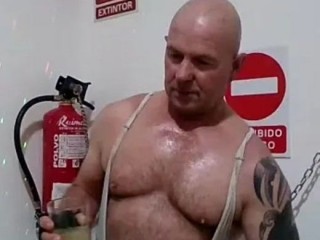It’ll be a month before actor Colman Domingo learns if he wins the Academy Award for his portrayal of civil rights activist and latter-day gay leader Bayard Rustin. And since we often learn of our history first through popular culture, and only later through reading and research, I thought I’d let that recent film, produced by Barak and Michelle Obama, be the jumping-off point as we look briefly at this important figure in Black and gay history.
Born in 1912 in Pennsylvania into a family of some means and influence, he was raised in the Quaker tradition of activism and non-violence. It was this that fueled his impulse to make a difference in the world around him. Of course, when someone like W.E.B DuBois is a frequent guest in your family home, you already have some big shoes to step into. It would be unfathomable not to have your path somewhat laid out.
![]()
Rustin was a student activist for social reforms since his early college days in Ohio, and then New York City where he joined socialist and communist organizations. His focus for many years was on social change: the unionization of Black workers in various fields; helping the team defending the Scottsboro Boys, the Alabama rape case that was the impetus behind To Kill A Mockingbird; lending aid to interred Japanese Americans in California in the forties, and organizing the early Freedom Rides to test anti-discrimination policies being passed. And arrested many, many times.
Of course, it’s his role as the key organizer of the 1963 March on Washington for Jobs and Freedom alongside Martin Luther King Jr. that the film focuses on. And here is where his sexuality and public work become nastily entangled.
When he was young he mentioned to his grandmother that he preferred spending time with males than females, to which she responded "I suppose that's what you need to do.” God bless grandmothers! He was arrested in Pasadena in 1953 for having sex in a car with two other men, and it’s this public record, and his openness within his circle of friends and activists, that overshadowed his work with King.
![]()
As often happens with public work of great importance, the face of the work can become irritatingly important. While he was the main organizer of the 1963 march, he chose to step out of the limelight in deference to King and others so that a more positive image could be presented. Some within the organization scuffed at his socialist politics, others at his sexuality. Allegations of an affair with King were floated by opposing forces within the organization, as well as by public figures like Sen. Strom Thurmond. These were quickly dismantled, but not ignored. Rustin chose to defer leadership to others; his work would still be accomplished.
As he once said, “I fundamentally consider sexual orientation to be a private matter. As such, it has not been a factor which has greatly influenced my role as an activist.”
It wouldn’t be until much later in his life, in the 80s, that he’d somewhat reluctantly get drawn into gay politics. His partner at the time of his death in 1987, Walter Naegle (whom Rustin had to legally adopt in order to protect their relationship, with marriage being illegal at the time!,) said that if it hadn’t been for his urgings, Rustin might never had responded to invitations to participate.
But when he did participate it was with unrelenting and characteristic honesty and bluntness. In a 1986 speech in support of the New York City Gay Rights Bill he claimed: “Today, blacks are no longer the litmus paper or the barometer of social change. Blacks are in every segment of society and there are laws that help to protect them from racial discrimination. The new ‘niggers’ are gays... It is in this sense that gay people are the new barometer for social change... The question of social change should be framed with the most vulnerable group in mind: gay people.”
Ironically, he declined to contribute to the book In the Life: A Black Gay Anthology explaining “I was not involved in the struggle for gay rights as a youth….While I have no problem with being publicly identified as homosexual, it would be dishonest of me to present myself as one who was in the forefront of the struggle for gay rights.”
But his influence as a gay activist and leader was certainly felt. For instance, it was his friendship with former Supreme Court Justice Thurgood Marshall who was aware of his sexuality that influenced his dissenting vote when the Court upheld state sodomy laws in the 1986 case Bowers vs. Hardwick. (This case was later overturned.)
![]()
Walter Naegel (L), Rustin's partner at the time of his death, with the Presidential Medal of Freedom.
I think we’ll let Barack Obama have the last word on this memorable life. On August 8, 2013, President Obama posthumously awarded Rustin the Presidential Medal of Freedom. The award statement proclaimed: “Bayard Rustin was an unyielding activist for civil rights, dignity, and equality for all. An advisor to the Reverend Dr. Martin Luther King, Jr., he promoted nonviolent resistance, participated in one of the first Freedom Rides, organized the 1963 March on Washington for Jobs and Freedom, and fought tirelessly for marginalized communities at home and abroad. As an openly gay African American, Mr. Rustin stood at the intersection of several of the fights for equal rights.”
Fleshbot: Plug In Get Off.
Questions? Comments? Email us at [email protected]
Follow us on Twitter and Instagram.
























